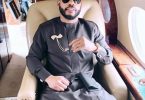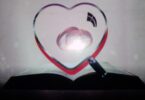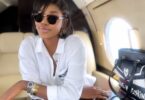Call him an all-round media personality and you won’t totally be wrong. Meet Omena Daniels; writer, brand architect, motivational speaker, lawyer, publisher, scriptwriter, host, The lounge, CEO avenue3media and executive director, OUCH. He opens up about a few of his passions, chief of which is his decision to rewrite the history of Delta State via DELTA 100 project.
What is the Delta 100 project all about?
It is basically part of the commemoration of 100 years of Nigeria. The centenary celebration got me thinking about doing something unique to equally celebrate Delta State indigenes who have been outstanding in their various endeavors in the last 100 years of the existence of Nigeria. We started the process of Delta 100 over two years ago and suddenly developed cold feet because we felt that Nigerians may not totally value the essence of what we plan to do as we lack a viable reading culture. But we eventually got round to kick starting it. Instead of making a history book, we decided to make a documentary and a photo book since Nigerians like to look at pictures. So rather than run lengthy interviews with these selected 100, we plan to run a short interview of not more than 200 or 300 words and just splash pictures of their growing up years till date. Basically focus on their lives and how they have been able to make something of themselves.
Why focus on only Delta State?
Because I am from there. Delta for me is home, my father is Isoko while my mother is from Itsekiri. Even though I was born in Lagos, I have had cause over the years, to constantly interact with people from all the tribes in Delta. I feel that I should bring development to my home state. Yes it is a cliché that home is the best place but I have since found out that if I put all of the abilities and skills that I have garnered over the years and use it to beam light on Delta State, then I know I have fulfilled a lifelong passion. There is a saying that it is only a bastard that looks back and insults his father’s house. If I see anything about my homestead that I believe I have the capacity to improve on, as a son of the soil, why not?
What are the criteria for coming up with 100 Delta state indigenes to showcase in a documentary and photo book ?
We have a nomination process which is still on-going. Anyone irrespective of whether you are from Delta State can nominate whoever they think is worthy of being showcased and my crew takes a thorough look at the person’s background with microscopic eyes and verifies the authenticity or otherwise of some of the claims by the person. Thereafter, the name, goes on a preliminary list if it meets the standards of the editorial crew. At the end of the day, we merge the nominations from online and those from traditional rulers to the vetting process where historians, people who have a fair knowledge of the goings on in Delta State and art enthusiasts, further prune down the list to 100. Members of these vetting process do not necessarily have to be Deltans because we want to give the vetting process a national flavour. Thereafter, we will now commence with putting together articles on the successful 100.
You mentioned earlier that a documentary will be part of the project
Yes we are doing a major documentary film which will focus on the final selected 100 Deltans. It will focus on their lives and times. There will be two other short documentary films one of which will be called ‘Unity in Diversity’, focusing on the different ethnic tribes in Delta State and how they have been able to synergize into one state. The other will be called, ‘Possibilities beckon’ and it will be about the tourism and business potentials of Delta State.
How has it been trying to get all of these done because it is obviously a lot of work?
It is quite tasking. I have been back and forth in Delta State for over a year, talking to government agencies, government functionaries, getting the government to endorse the project because Delta State is large and we would need help from the government to get all of these accomplished. Also, putting in place an event team, a production crew, a research crew domiciled in Delta State to carry out editing and research, a logistic team which interfaces with the traditional rulers and teams in Lagos working on corporate sponsorship. I must add that it is financially draining. The challenges are huge but pales in significance to the eventual outcome of the project.
With such a humongous project to execute, what exactly is in it for you?
For me as a Delta State indigene, I will say I am a visionary and as a writer, being able to chronicle a part of history is outstanding alone. Cooking up this project is a fulfillment for me. As a person, it has suddenly made me feel like a walking encyclopedia of Delta State. But most important, I am only interested in giving back. It is my hope that 50, 100 years down the line, there will be a crop of young ones who would benefit from this project which will also include summits and leadership programmes and who I would expect to carry on from where I stopped. I expect to have successors because there is no success without a successor.
All through the process of collating names, meeting with fellow Deltans and travelling the length and breadth of Delta, what would you say was most outstanding for you?
What I have learnt and still learning is that as diverse as they are, Deltans have very similar traits. The average Deltan is strong but also laid back. Laid back in the sense that nothing is too important to him. The average Deltan knows how to laugh, have a good time but isn’t a push over irrespective of his economic status or educational background. An average Deltan works hard and cannot be over looked, he strives to be on top and even when you try to relegate him, he ensures he creates his own fun wherever he finds himself. They are generally happy people.
Is this project like a spring board to your eventual foray into politics?
Well if politics is about position, office and what you would get, in terms of having a sense of entitlement as a leader, then no, I am not interested. But if politics would put me in a position to deliver dividends to the people of Delta, to enrich and develop them, to bring people who before now were relegated to the fore, then yes, I think I would want to go into politics.
Your write ups have graced the pages of newspapers, magazines and books, inspiring both young and old. Why did you dump the wig for the pen?
I have always wanted to be a writer, to build on my innate skills to write and talk but every other person felt I would be better off studying law including my parents. My personality didn’t fit into law but I did it anyway to satisfy my father.
Do you hope to dust up your law certificate some day?
No, I won’t be needing it.
You were once a publisher of a lifestyle magazine called Bloke which you aptly called a ‘bible’ on men for women. What happened to it. Has it been rested?
It is still closest to my heart and no it hasn’t been rested. It is now on line but with plans to publish a bumper edition of all the on line editions every year. The reading culture in Nigeria I must reiterate hasn’t improved hence the need to go on line. But I must add that Bloke was ahead of its time.
And you write seamlessly on relationships yet you aren’t married. What gives you the authority to talk about relationships?
I started writing about relationships at age 15 for church journals, working with singles fellowship and till date, I have compiled over 200 relationship quotes. Besides, my father is a Bishop and I have heard him talk about marriage and relationships on countless occasions. I grew up among women from whom I learnt quite a lot about their opinion on men and what they expect of their men. So I learnt the female perspective about men from a young age even before I learnt that of men. Let’s just say that I have a very robust relationship background.
What would you say must have significantly shaped you to be who you are today?
Several things. From a very young age, I was very much into putting up a show. I was a shy kid but all that shyness disappears when you put a microphone in my hands or place me in front of an audience. I was also a go-to – ideas person. I grew up wanting to do all these things and that is basically why I am who I am today.








Leave a Comment
You must be logged in to post a comment.